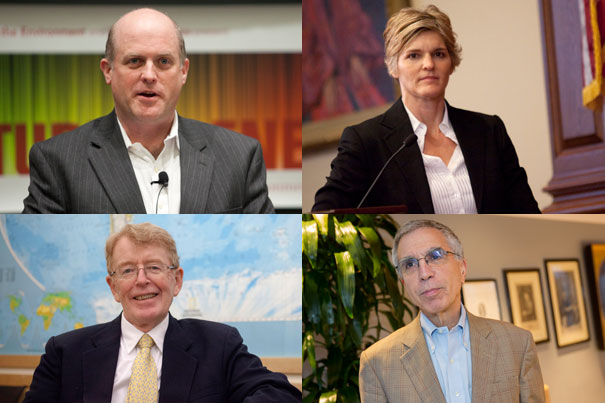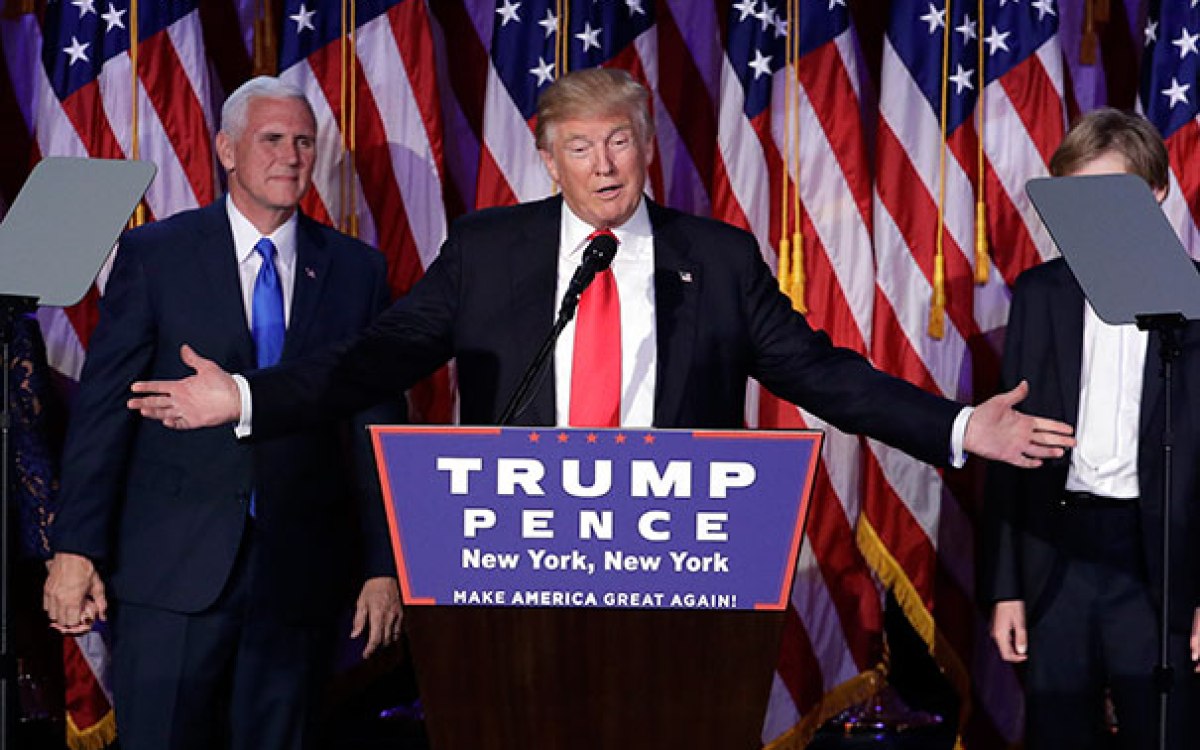
Daniel Schrag (clockwise from top left), head of the Harvard University Center for the Environment; Jody Freeman, faculty director of Environmental Law Program at HLS; Robert Stavins, head of the Harvard Project on Climate Agreements; and Mike McElroy, Gilbert Butler Professor of Environmental Studies, believe the nation’s environmental protection regulatory framework would be difficult to dismantle. “There is no question that there will be a regulatory rollback, but its scope is still unknown,” Freeman said.
File photos by Kris Snibbe, Jon Chase/Harvard Staff Photographers
What’s next for climate change policy
A Trump administration can do plenty to undercut Obama’s efforts, but it could compromise too, Harvard analysts say
More like this
Regulations to fight climate change likely will be casualties of the incoming Trump administration, but environmental experts taking stock of the changing American political landscape said that work in the field will continue elsewhere and that a broad-based rollback of U.S. environmental protection will prove easier said than done.
Though President-elect Donald Trump hasn’t yet announced an environmental agenda, his campaign claim that climate change is an expensive hoax, his blanket support for the fossil fuel industry, and his criticism of the Environmental Protection Agency (EPA) have environmentalists worried.
In addition, Republicans have majorities in the House and Senate, and they generally believe that environmental regulations can harm economic growth and improperly extend the reach of government. So environmentalists foresee a broad attack on the nation’s framework of environmental regulations.
Still, Harvard environmental experts forecast a complex mosaic for the years ahead, one that has problems and likely is rife with litigation, but that also continues momentum toward a cleaner world because of a combination of market forces, economic factors, and continued efforts by other nations, states, and local governments.
“Trump could unilaterally withdraw from the Paris Agreement, renouncing U.S. leadership on international climate negotiations. And he could try to rescind or weaken some important regulations, like the Clean Power Plan,” said Jody Freeman, the Archibald Cox Professor of Law and director of Harvard Law School’s Environmental Law Program. “But any effort to fully unravel the substantial and meaningful regulatory initiatives of the last eight years will be long, complicated, and difficult, and in the end likely only partial because of the significant legal, political, and practical barriers to doing so.”
Federal environmental agencies likely are in for tough times, even without new laws being passed or existing ones repealed, the analysts said. The power to make political appointments and set budgets means an agency easily can be slowed by underfunding or new leadership hostile to its mission.
Daniel Schrag, the Sturgis Hooper Professor of Geology, professor of environmental sciences and engineering, and head of the Harvard University Center for the Environment said it’s hard to project just what effect Trump’s presidency will have on global climate efforts. The effects of climate change are so enormous that the actions of any one nation over four years will have limited impact.
“It’s a long march to a low-carbon world,” Schrag said. “We knew it wasn’t going to be easy. Being successful means being able to weather setbacks like this one.”
It’s even possible, he said, that a federal agenda the public sees as too hostile to climate change action could spark a backlash that leads to new reforms.
“I don’t know how you get from here to there,” Schrag said. “[But] there’s always a path forward.”
Freeman acknowledged there is a “long list of worst-case scenarios” but cautioned against taking campaign rhetoric at face value. It doesn’t appear the president-elect has been fully briefed on climate science or fully considered the impact that withdrawing from the Paris Agreement on climate change would have on our relationships with other nations, she said.
“The truth is, we don’t entirely really know what President Trump will do on climate, energy, and environment,” Freeman said. “His positions on other issues have changed, and that might happen here too. It is entirely possible that he will conclude that he can achieve his domestic energy agenda without jettisoning Paris, and he might even be persuaded that it makes more sense to embrace the international goal of emission reductions, but say he has a better way to get there than by Obama-style regulation. In other words, we must wait for the dust to settle.”
Here, then, is the tote board for what so far seems likeliest to happen on climate change issues:
Clean power and Paris
The most probable casualties of the incoming administration are recent U.S. steps to fight climate change in the energy sector, and the United States’ leadership in the international community on the issue.
Obama’s Clean Power Plan, which seeks to shift electricity generation in the United States away from polluting sources such as coal, is currently being reviewed by the U.S. Court of Appeals for the D.C. Circuit. If its decision supports the plan and is appealed to the U.S. Supreme Court, it would likely fail, since Trump has said he will appoint a conservative justice to fill the current high court vacancy.
A simpler solution might be for the administration to withdraw the Clean Power Plan and replace it with a less-stringent version, which would be within the new president’s power, Freeman said in an analysis of the environmental ramifications of a Trump presidency.
Another probable target is the Paris Agreement, which Trump said he would cancel. While upending the entire agreement, negotiated by 195 countries, is beyond his power, Trump could withdraw the United States’ participation. Since the agreement has taken effect, that process would take four years to accomplish, according to Robert Stavins, the Albert Pratt Professor of Business and Government and head of the Harvard Project on Climate Agreements.
Alternatively, Trump also could submit the plan to the U.S. Senate to ratify, where it most likely would fail, Stavins said.
The most dramatic option for a Trump administration would be to try to remove the United States from the underlying Framework Convention on Climate Change, signed by President George H.W. Bush and ratified by the Senate in 1992, Stavins said. That would remove this nation from the Paris Agreement in just a year. But there are serious questions with that approach regarding how the necessary legal steps and the political implications might play out.
Stavins said that the simplest way to render U.S. participation in the Paris Agreement meaningless, however, would be to announce the country will not comply with the pact’s carbon emission reductions — which are essentially voluntary. Obama set the reduction target at between 26 and 28 percent below 2005 levels by 2025.
The international impact
The loss of the U.S. leadership internationally on climate change could convince other nations not to honor their own commitments, and will “certainly not encourage greater action,” Stavins said. But for those states committed to climate action, that wouldn’t necessarily slow their progress.
Mike McElroy, the Gilbert Butler Professor of Environmental Studies and head of the Harvard China Project, said China most likely will continue to reduce its emissions regardless of what the United States does, because Chinese action is driven in part by rampant air pollution that the nation’s leadership has committed to address. The solutions there overlap with those for climate change.
A hazard for U.S. industry, McElroy said, would be that, in addition to climate impact, the country likely would cede leadership in developing the energy technology of tomorrow.
The future for coal
Whatever the eventual U.S. positions on climate and the environment, it will be tough for Trump to reverse the coal industry’s decline, the experts said, even though he has been a dogged backer of coal’s future. Market forces, not environmental regulation or political shifting, have hurt the industry most. Advances in fracking technology have brought vast new supplies of natural gas to the market, driving prices down and undercutting coal. In fact, Stavins said, Trump’s pledged support for fracking could wind up hurting coal further.
Prospects for renewable power
At least in the short term, wind and solar power generation likely will be shielded by existing tax incentives and state renewable energy policies. The federal incentives extend to 2019 for wind and 2023 for solar. The state policies include requirements that a portion of electricity supply come from clean sources, ensuring continued demand: “There is a broad national consensus that renewable energy is an important investment for the country,” McElroy said.
In addition, windy states in the middle of the country — from the Canadian border down to Texas — will likely support a continuation of the tax incentives into the future, Schrag said.
Regulation at lower government levels
A shift in the federal government’s stance on climate and energy also won’t automatically reverse local, state, and regional action, McElroy said. California, with the nation’s largest economy, has already adopted a cap-and-trade system to reduce carbon emissions and lower its carbon footprint.
Cities are also taking steps to address climate change and have banded together to form a global climate action network, McElroy said.
The Environmental Protection Agency
A likely target of the administration and Congress is the EPA, the federal agency charged with enforcing America’s environmental laws. It is unlikely that the EPA would be abolished outright, since Senate Democrats have enough seats to block such a move through filibuster, according to Stavins and Freeman.
But a lot of damage can be done by naming leaders antagonistic to the agency’s mission and by starving it of funding, Schrag said. Trump has already named a climate change skeptic, Myron Ebell, to oversee the transition at EPA.
Though attention is often focused on an agency’s top leadership, Stavins pointed out that there are also hundreds of political appointees who will take important positions within the administration and influence its work over the next four years.
“That may be my greatest worry,” Stavins said.
Funding for climate science research
Federal budgets have been tight for years, and funding constrained for all kinds of science. But if the new Congress adopts an anti-climate-change stance and seeks even deeper budget cuts, funding for climate research could be targeted, Schrag said.
If that’s the case, Schrag said, there’s an opportunity for institutions like Harvard to pick up the slack, as the University did in supporting stem cell research and establishing the Harvard Stem Cell Institute during the Bush administration.
“We’re not there yet, but if President Trump chooses to slash NASA, NOAA, NSF budgets for climate research, I think there’s an opportunity for universities like Harvard … to step up and say ‘This is important to the world,’” Schrag said, referencing the National Aeronautics and Space Administration, the National Oceanic and Atmospheric Administration, and the National Science Foundation. “Obviously, we should hope for the best, but prepare for the worst.”
Other environmental regulations
Another important area of influence, Freeman said, is in promulgating regulations.
The administration has the power to review regulations that implement environmental laws, and can decide to rescind them, Freeman said. That power, however, isn’t unfettered, as the administration has to justify its actions — in court if challenged — and must observe existing laws, even those that require it to issue environmental regulations.
“There is no question that there will be a regulatory rollback, but its scope is still unknown,” Freeman said. “And there is no question that the rhetoric and politics of the next four years will not sound or feel anything like the eight years of the Obama administration, when climate change was at the very top of the domestic and international agenda. But while the environmental community should prepare for the worst, it should be open to the possibility that the most dire predictions may not come true, and help nudge the new president to a softer landing.”






